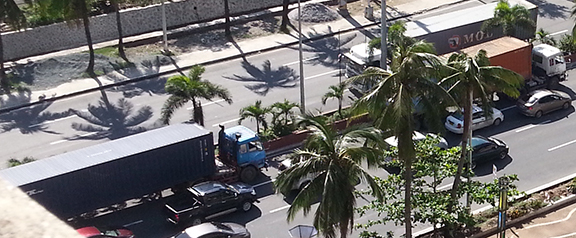
-
Pilot testing of the Unified Logistics Pass (ULP) in three initial sites in Luzon has been completed, the Anti-Red Tape Authority says
-
ARTA is finalizing a joint memorandum circular that will formalize the agreement on implementing ULP in the pilot areas of Cavite Export Processing Zone, Clark Freeport Zone, and Subic Bay Freeport Zone
-
ARTA hopes the system can be pilot-tested in Philippine Ports Authority ports under its new management
The Anti-Red Tape Authority has completed the pilot testing of the Unified Logistics Pass (ULP) in three initial sites in Luzon, according to ARTA officer-in-charge and deputy director general for operations Ernesto Perez.
ARTA is now finalizing a joint memorandum circular to implement ULP in the pilot areas of Cavite Export Processing Zone, Clark Freeport Zone, and Subic Bay Freeport Zone, Perez told PortCalls in a chance interview on the sidelines of the 2022 Supply Chain Conference of the Supply Chain Management Association of the Philippines on September 22.
ULP went live in the three pilot areas in May.
ARTA initially wanted to include 11 major ports in the pilot testing but had to hold back its implementation due to “resistance from the Philippine Ports Authority (PPA)”, Perez said in a speech to the conference.
Several ports under the PPA were initially part of the pilot implementation plan. But Perez earlier said the ports authority had refused to adopt the ULP and sign the JMC for the system –which was signed by various other agencies and private sector participants in January – saying the PPA ports already have a system in place.
Perez said he hopes ARTA would be able to conduct the testing in major ports in the country under PPA’s new management.
Moving forward, Perez said ARTA will continue to assess the pilot implementation of ULP and determine and finalize the streamlined guidelines for the system. To ensure sustainability of the project, ARTA will also institutionalize a monitoring and evaluation mechanism.
Nationwide roll-out of the project will be in 2023, Perez had said earlier.
The ULP is a single pass quick response (QR) code that will be issued to cargo trucks to ensure the unhampered flow of goods. It adopts a single registration scheme for trucking companies, and the QR code provided would be scanned and accepted by all government agencies including local government units (LGUs), port authorities, and economic zones.
It is intended to eliminate the various permits, licenses, and pass-through stickers being required by economic zones, ports, and LGUs to facilitate movement and ease of port-entry of cargo trucks.
The project was officially launched last January with the signing of a memorandum of agreement (MOA) and a JMC for the pilot implementation by various government agencies, port operators, and private sector partners.
On June 28, ARTA and ULP system creator Developers Connect Philippines Inc. (DevCon) formally turned over the ULP system to the Land Transportation Franchising and Regulatory Board (LTFRB).
Under the ULP’s MOA, once the ULP pilot implementation is completed, the LTFRB will become the owner and lead implementer of the ULP system. On May 16, the Department of Science and Technology-National Capital Region also formally turned over to the LTFRB 244 mobile devices and 344 popwerbanks to be used in implementing ULP. The mobile devices will be needed to scan the QR codes.
Citing data from the World Bank (WB), ARTA said earlier that the ULP system is projected to streamline documentary requirements from 209 to 56, or by about 73%, and cut processing time from 271 days to 35 days, or by 87%.
Using standard model cost calculation, the WB also said the Philippine government can save more than P1.9 billion in funds with ULP.
Implementing the ULP is also seen to cut the cost of basic goods by eliminating various port and pass-through fees that truckers have to pay and eventually pass on to clients.
Stakeholders, especially truckers, have long been complaining about these pass-through fees collected by LGUs, especially in Metro Manila.
ULP is a migration from the RapidPass, an online system developed by DevCon and was implemented in 2020 giving frontliners and Allowed Persons Outside of Residences quick passage through checkpoints in Metro Manila during community quarantine periods.
ULP is part of ARTA’s National Efforts for the Harmonization of Efficient Measures of Inter-related Agencies, or Project NEHEMIA. Launched in March 2020, Project NEHEMIA is a sector-based streamlining that involves both capacity building with identified agencies and public hearings with stakeholders regarding existing and new regulations.
Logistics is one of five sectors included in the first phase of Project NEHEMIA. Under the project, the goal is to reduce within 52 weeks the time, cost, requirements, and procedures involved in government transactions in sectors of economic and social significance.
In October 2020, ARTA launched Project NEHEMIA for the logistics sector to integrate all the “sticker requirements” imposed on cargo trucks by concerned government agencies and LGUs. – Roumina Pablo




